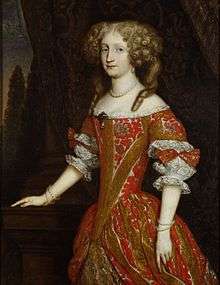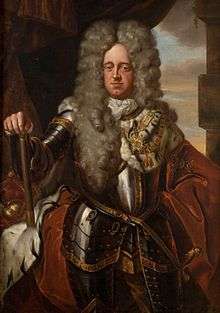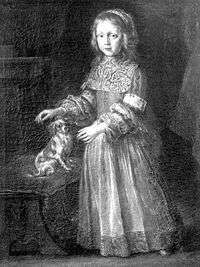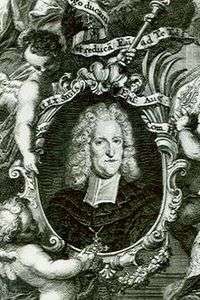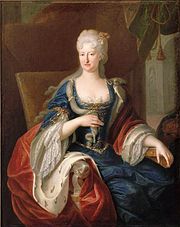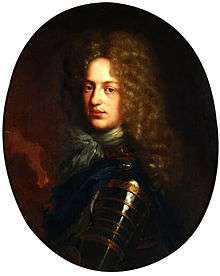Landgravine Elisabeth Amalie of Hesse-Darmstadt
Landgravine Elisabeth Amalie of Hesse-Darmstadt (Elisabeth Amalie Magdalene; 20 March 1635 – 4 August 1709) was a princess of Hesse-Darmstadt and wife of the Prince-elector of the Palatinate.
| Elisabeth Amalie of Hesse-Darmstadt | |||||
|---|---|---|---|---|---|
| Electress Palatine | |||||
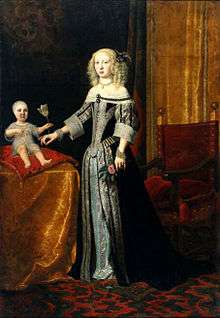 Elisabeth Amalie, probably with her eldest daughter Eleonore, around 1655 | |||||
| Born | 20 March 1635 New Palace, Gießen, Germany | ||||
| Died | 4 August 1709 (aged 74) Neuburg Palace, Neuburg, Germany | ||||
| Burial | Neuburg an der Donau, Germany | ||||
| Spouse | |||||
| Issue Detail | Eleonor Magdalene, Holy Roman Empress John William, Elector Palatine Charles III Philip, Elector Palatine Alexander Sigismund, Bishop of Augsburg Francis Louis, Archbishop of Trier Maria Sophia, Queen of Portugal Maria Anna, Queen of Spain Philip William August of Neuburg Dorothea Sophie, Duchess of Parma Hedwig Elisabeth, Princess Sobieski | ||||
| |||||
| House | Hesse-Darmstadt | ||||
| Father | George II, Landgrave of Hesse-Darmstadt | ||||
| Mother | Sophia Eleonore of Saxony | ||||
| Religion | Roman Catholicism prev. Lutheranism | ||||
Biography
Born at the New Palace in Gießen, Elisabeth Amalie was the daughter of George II, Landgrave of Hesse-Darmstadt and Sophia Eleonore of Saxony. Her siblings included Louis of Hesse-Darmstadt, future Landgrave of Hesse-Darmstadt and Anna Sophia, Abbess of Quedlinburg.
Elisabeth Amalie was brought up strictly by her mother, who was a devout Lutheran. She had an attractive appearance with striking blond hair, a trait she kept until her old age and which was inherited by her daughters Eleonor Magdalene and Dorothea Sophie, the latter being known in particular for her blonde hair.
On 3 September 1653 she was married at Langenschwalbach to Count palatine Philip William of Neuburg, who later became Prince-elector of the Palatinate. Her husband was some twenty years older than she and was the heir to the Electoral Palatinate which was one of the most important states within the Holy Roman Empire.
She converted to Catholicism on 1 November 1653 in the presence of the elector and archbishop of Cologne, Maximilian Henry of Bavaria.
The writer William Nakatenus dedicated his work The Heavenly Palm little garden to her.
Issue
| Issue | |||||||||||||||||||||||||||||||||||||||||||||||||||||||||||||||||||||||||
|---|---|---|---|---|---|---|---|---|---|---|---|---|---|---|---|---|---|---|---|---|---|---|---|---|---|---|---|---|---|---|---|---|---|---|---|---|---|---|---|---|---|---|---|---|---|---|---|---|---|---|---|---|---|---|---|---|---|---|---|---|---|---|---|---|---|---|---|---|---|---|---|---|---|
|
Ancestry
| Ancestors of Landgravine Elisabeth Amalie of Hesse-Darmstadt | |||||||||||||||||||||||||||||||||||||||||||||||||||||||||||||||||||||||||||||||||||||||||||||||||||||||||||||||||||||||||||||||||||||||||||||||||||||||||||||||||||||||||||||||||||||||||||||||||||||||||||||||||||||||||||||||||||||||||||||||||||||||||||||||||||||||||||||||||||||||||
|---|---|---|---|---|---|---|---|---|---|---|---|---|---|---|---|---|---|---|---|---|---|---|---|---|---|---|---|---|---|---|---|---|---|---|---|---|---|---|---|---|---|---|---|---|---|---|---|---|---|---|---|---|---|---|---|---|---|---|---|---|---|---|---|---|---|---|---|---|---|---|---|---|---|---|---|---|---|---|---|---|---|---|---|---|---|---|---|---|---|---|---|---|---|---|---|---|---|---|---|---|---|---|---|---|---|---|---|---|---|---|---|---|---|---|---|---|---|---|---|---|---|---|---|---|---|---|---|---|---|---|---|---|---|---|---|---|---|---|---|---|---|---|---|---|---|---|---|---|---|---|---|---|---|---|---|---|---|---|---|---|---|---|---|---|---|---|---|---|---|---|---|---|---|---|---|---|---|---|---|---|---|---|---|---|---|---|---|---|---|---|---|---|---|---|---|---|---|---|---|---|---|---|---|---|---|---|---|---|---|---|---|---|---|---|---|---|---|---|---|---|---|---|---|---|---|---|---|---|---|---|---|---|---|---|---|---|---|---|---|---|---|---|---|---|---|---|---|---|---|---|---|---|---|---|---|---|---|---|---|---|---|---|---|---|---|---|---|---|---|---|---|---|---|---|---|---|---|---|---|---|---|
| |||||||||||||||||||||||||||||||||||||||||||||||||||||||||||||||||||||||||||||||||||||||||||||||||||||||||||||||||||||||||||||||||||||||||||||||||||||||||||||||||||||||||||||||||||||||||||||||||||||||||||||||||||||||||||||||||||||||||||||||||||||||||||||||||||||||||||||||||||||||||
References
- Choker, Peter, Diseases of the kings of Spain: the Austrians. From Madness to impotence Joan of Charles II the Bewitched (Madrid: The Sphere Books Ltd., 2005).
External links
- http://thepeerage.com/p11212.htm#i112112
- https://web.archive.org/web/20140306112911/https://www.duesseldorf.de/stadtmuseum/sammlung/04/012/10203.shtml
- Marek, Miroslav. "brabant/brabant13.html". genealogy.euweb.cz.
- Marek, Miroslav. "wittel/wittel4.html#PW". genealogy.euweb.cz.
- Kulturgeschichte der Stadt Schwalbach, p. 39, at Google Books
- Annalen des Historischen Vereins für den Niederrhein, insbesondere die alte Erzdiözese Köln, p. 237, at Google Books
| Preceded by Wilhelmina Ernestine of Denmark |
Electress Palatine 1685–1690 |
Succeeded by Anna Maria Luisa de' Medici |
